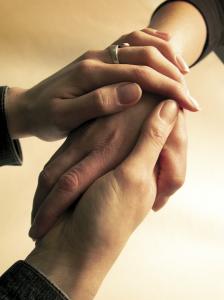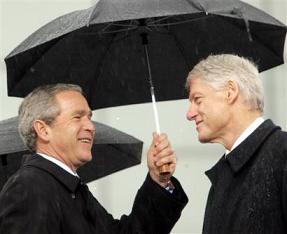 “It is more blessed to give than to receive.” Those words come from the Bible (Acts 20:35). For many of us in the church, they’ve become a rule for living. Give... Care... Act... Do. The voice of responsibility echoes in our heads, and we heed it.
“It is more blessed to give than to receive.” Those words come from the Bible (Acts 20:35). For many of us in the church, they’ve become a rule for living. Give... Care... Act... Do. The voice of responsibility echoes in our heads, and we heed it.I’ve known people, in the course of my ministry, who are the first to sign up to offer intercessory prayers for others – but who, in their own hour of sickness or need, never allow their own name to be added to the list. I’ve known preachers who can’t sit in a pew and tune their hearts to someone else’s sermon. I’ve seen how, at our annual Christmas Dinner – jointly sponsored by our church and the local food pantry, for the economically and emotionally needy – certain volunteers are reluctant to sit down at the tables with our guests and enjoy the plenteous food. They have to be begged and cajoled: “Really – it’s OK. We’ve got plenty of other servers, there’s more than enough for everyone, and our guests would enjoy talking with you!”
 Maybe it is more blessed to give than to receive, but that doesn’t mean receiving isn’t a blessing in itself. It’s a lesson I’ve been learning, as church members show up on our doorstep every other day or so, with meals-on-wheels for their pastor and his family. When I hear the doorbell ring around five p.m. on a Monday, Wednesday or Friday, my first, unthinking reaction is to feel a little embarrassed. Sure, these suppers are a great help. They allow us to focus on the really important things, in these tough days. But isn’t there someone else who could use this help more?
Maybe it is more blessed to give than to receive, but that doesn’t mean receiving isn’t a blessing in itself. It’s a lesson I’ve been learning, as church members show up on our doorstep every other day or so, with meals-on-wheels for their pastor and his family. When I hear the doorbell ring around five p.m. on a Monday, Wednesday or Friday, my first, unthinking reaction is to feel a little embarrassed. Sure, these suppers are a great help. They allow us to focus on the really important things, in these tough days. But isn’t there someone else who could use this help more?Sure there is. But that’s not the point. We’re living in community with others, and one of the things this community has chosen to do is to help us out in this way. Some days we give, and other days we receive. Ebb and flow. That’s just the way it is.
Mary Cook is a woman who tragically lost her fiancé in a freak accident, as he fell from a roof. Earlier this year, in an essay broadcast on National Public Radio, she talked about her complex feelings, as she learned to receive help from others while she was immobilized by grief:
“Before Jon's death, I took pride in the fact that I rarely asked for help or favors. I defined myself by my competence and independence. So who was I if I was no longer capable and busy? How could I respect myself if all I did was sit on the couch every day and watch the snow fall?”
But her friends would hear none of those feeble arguments. They insisted she learn to receive:
“Over and over, I heard similar sentiments from the people who supported me during those dark days. One very wise man told me, ‘You are not doing nothing. Being fully open to your grief may be the hardest work you will ever do.’
I am not the person I once was, but in many ways I have changed for the better. The fabric of my life is now woven with gratitude and humility. I have been surprised to learn that there is incredible freedom that comes from facing one's worst fear and walking away whole. I believe there is strength in surrender.”
Like Mary, I must keep reminding myself that I’m not doing nothing. Battling cancer – the physical aspects of the struggle alone, let alone the emotional – is pretty close to a full-time job. By God’s grace, I’ll beat this thing, and get back to doing ministry again. When that day comes, I expect I’ll be better-equipped to give – for I will have learned how to receive.
